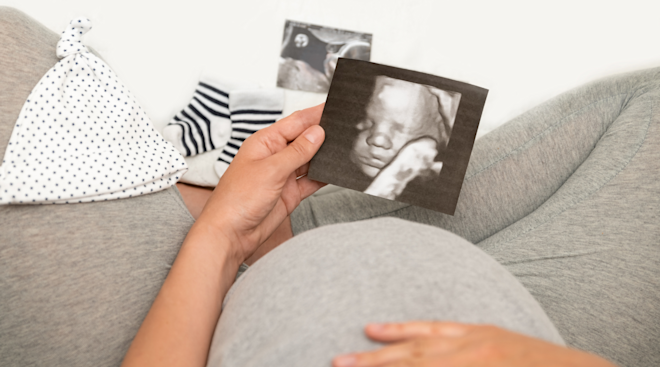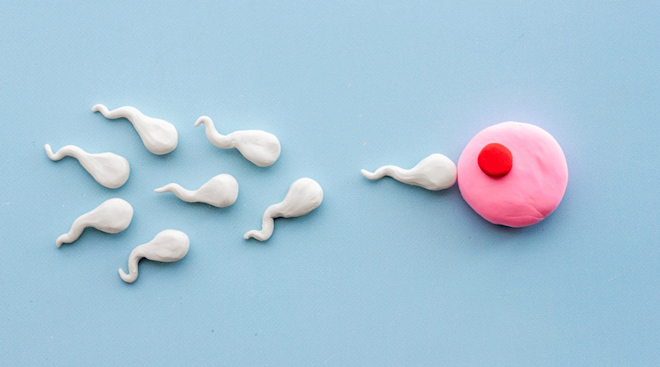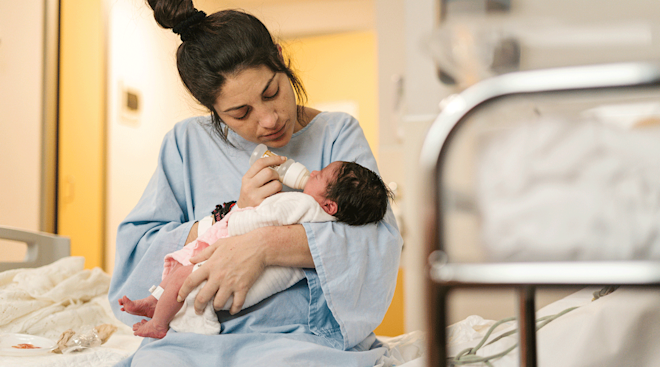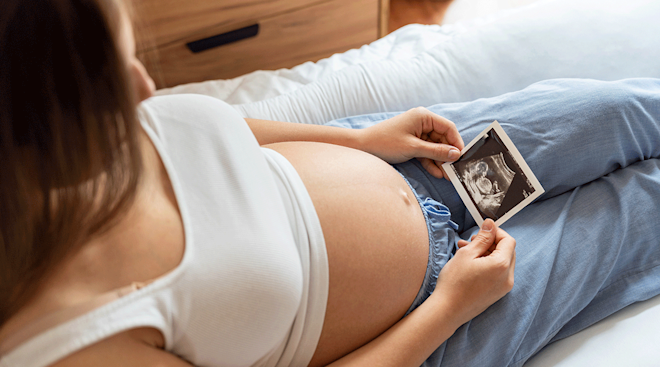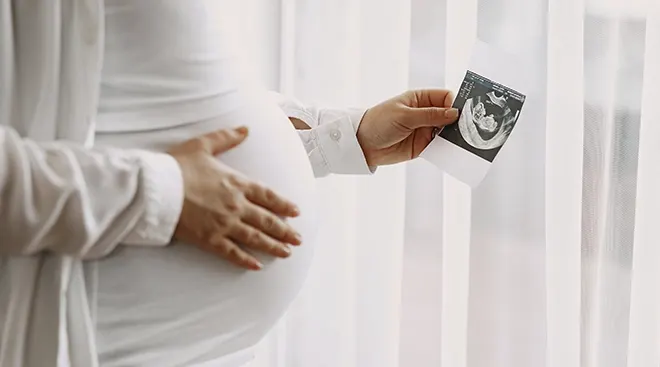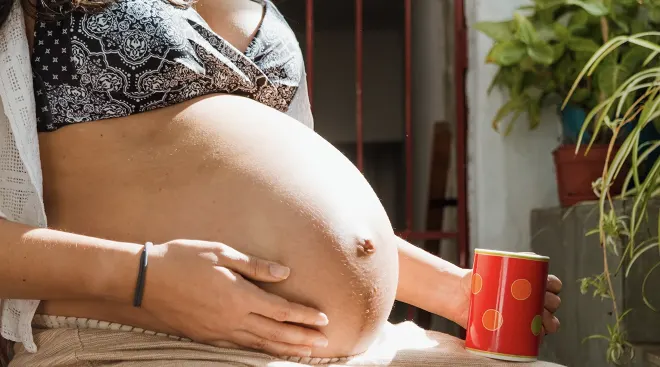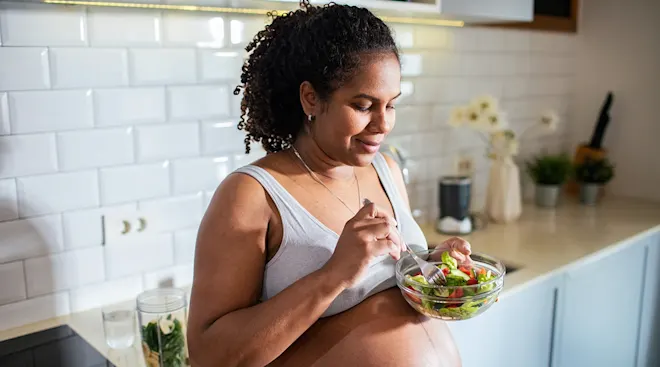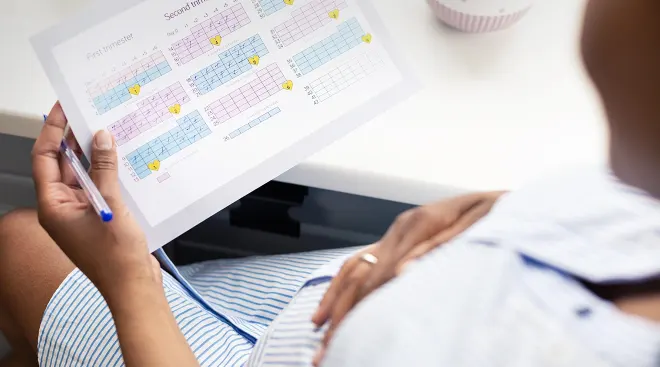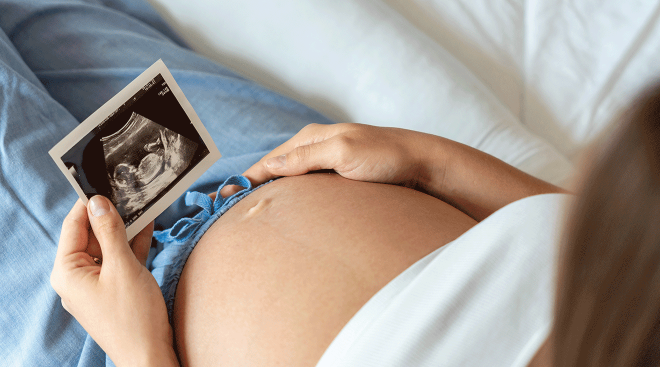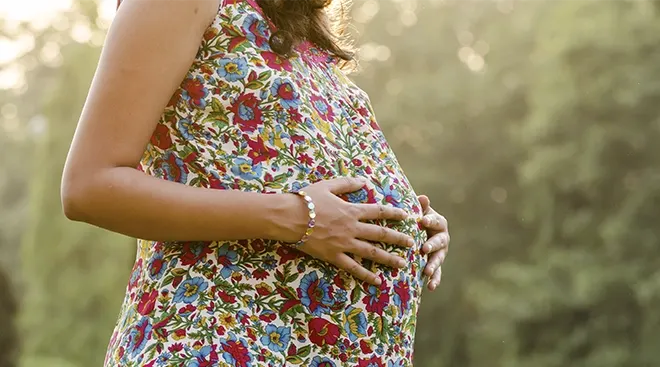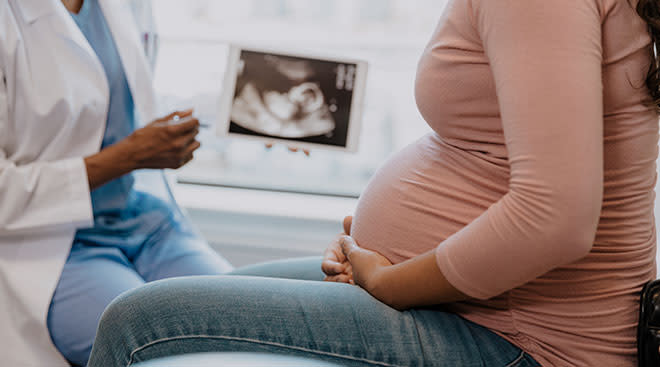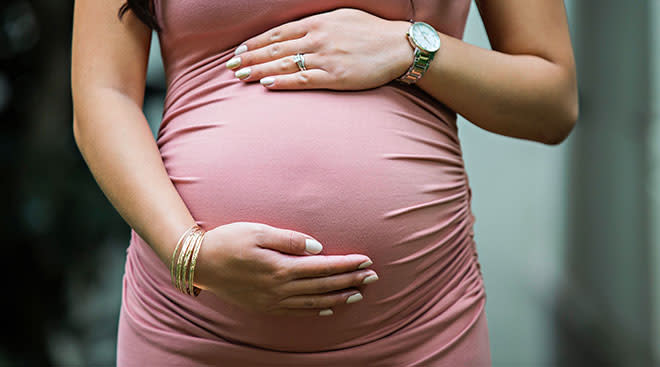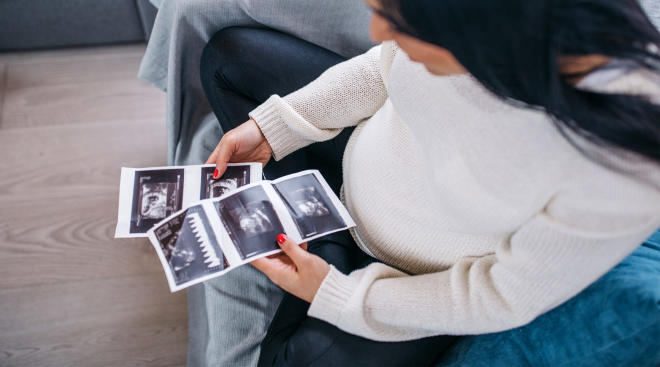When Does a Baby Have a Heartbeat?
Hearing baby’s heartbeat for the first time is one of the most exciting new-mom milestones. If you’re preparing for your first pregnancy ultrasound, you might be wondering: When does a baby have a heartbeat? Here’s what to know about how baby’s heart develops during pregnancy and when you’ll be able to hear the fetal heartbeat.
According to the Journal of Prenatal Medicine, the heart begins forming between weeks 3 and 4 of gestation, and starts beating more regularly around week 5. By week 6, the fetal heartbeat is consistent at around 105 beats per minute (bpm), says March of Dimes.
A baby heartbeat can be seen on an ultrasound pretty early in pregnancy, although it can depend on the type of ultrasound being performed. A vaginal ultrasound is more accurate in the first few weeks, and can often detect a fetal heartbeat around 6 weeks gestation, while an abdominal ultrasound can usually pick it up by 7 weeks, says the American Pregnancy Association (APA).
What if your provider can’t detect a fetal heartbeat?
There are many reasons your provider might not be able to detect a baby heartbeat through ultrasound at the beginning of pregnancy. Some of them point to a potential problem with your pregnancy, but often there’s not any cause for concern.
Mary Margaret McGue, MD, an ob-gyn at Summit Health in New Jersey, says it’s common to incorrectly calculate baby’s gestational age when you first find out you’re pregnant, which may mean you’re looking for a heartbeat on an ultrasound sooner than it’s possible to see one. “We base gestational age off of your last menstrual period (LMP) with the assumption that the typical woman ovulates about 14 days after the onset of their LMP,” she explains, “[but] not every woman’s body ovulates on this time schedule.”
This normal variation in ovulation timing is one reason why your provider might schedule you for a dating ultrasound, which McGue says is the best tool for accurately establishing how far along you are: This ultrasound looks for the gestational sac and yolk sac and, if possible, takes crown-to-rump measurements of baby, all of which help your provider figure out your gestational age. If a fetal heartbeat isn’t detected yet, it may simply be because you’re earlier in your pregnancy than you initially thought; if that’s the case, McGue says you’ll likely be scheduled to have another ultrasound in two weeks to look again.
Your body size can potentially play a part too. If you’re overweight or obese, McGue says it could be harder to detect a baby heartbeat without a transvaginal ultrasound, so a provider using only a small handheld device may not be able to pick it up.
There’s also a possibility that not finding a fetal heartbeat means you’ve experienced a miscarriage. Miscarriages are unfortunately common, affecting 10 to 20 percent of pregnancies, according to research. If you need help coping with the difficulty of a miscarriage, it’s important to reach out to a mental health provider.
It’s harder to find a fetal heartbeat on a handheld doppler device than on an ultrasound. Michael Tahery, MD, an ob-gyn and urogynecologist practicing in Los Angeles, says providers can usually detect the heartbeat with a doppler between 10 and 12 weeks gestation.
That’s one reason why women typically have a prenatal visit scheduled during those weeks: It might be the first time you hear baby’s heartbeat (unless you’ve had a dating ultrasound earlier).
The average heartbeat of a fetus in the first trimester is around 180 bpm, says G. Thomas Ruiz, MD, lead ob-gyn at MemorialCare Orange Coast Medical Center in Fountain Valley, California. It can be anywhere from 120 to 160 bpm in the second and third trimester.
Fetal heartbeat by week
Baby’s heart rate fluctuates throughout pregnancy, beating its fastest in the first trimester, then gradually slowing down as your pregnancy continues. On average, according to research, baby’s heart will beat at:
- 110 bpm at 6 weeks
- 170 bpm at 9 to 10 weeks
- 150 bpm at 14 weeks
- 140 bpm at 20 weeks
- 130 at 40 weeks
Does baby heartbeat indicate gender?
Unfortunately, you can’t skip the line and find out baby’s sex by knowing the fetal heartbeat. “Some people believe that a heart rate less than 140 bpm indicates a male and more than 140 bpm indicates a female, but this isn’t reliable,” says Ruiz, adding that “heartbeat variability is considered a sign of a healthy fetus.”
What eventually becomes a four-chamber heart starts as pulsating tissue inside the developing embryo, says Ruiz. This is what you might be able to see on an ultrasound at 6 weeks gestation. By 8 weeks, that pulsating tissue has turned into the primary vessels and structures of the heart, says Tahery, although some other vessels won’t develop until the second trimester. By 18 to 22 weeks gestation, baby’s heart is basically formed and functioning the way it’s supposed to—that’s why you’ll be scheduled for an anatomy scan around this time.
During pregnancy, baby’s heart is continually sending blood to the lungs to collect oxygen and then distributing that oxygenated blood to the rest of the cells in the body, says Tahery. Before baby’s born, their lungs aren’t mature enough to oxygenate blood yet, so the placenta does that work instead, he adds.
Bottom line: The fetal heart develops long before you even realize you’re pregnant (at around 3 weeks gestation) and by the middle of the second trimester, it’s already doing basically everything it will ever need to do: pumping blood through the body to supply baby’s cells with oxygen. Because the heart forms and starts working so quickly, baby typically has a heartbeat at around 5 weeks gestation. You can usually detect the heartbeat by ultrasound at 6 to 7 weeks and by doppler at 10 to 12 weeks.
Please note: The Bump and the materials and information it contains are not intended to, and do not constitute, medical or other health advice or diagnosis and should not be used as such. You should always consult with a qualified physician or health professional about your specific circumstances.
Plus, more from The Bump:
Mary Margaret McGue, MD, is an ob-gyn at Summit Health in New Jersey. She received her medical degree from Rutgers New Jersey Medical School.
G. Thomas Ruiz, MD, is the lead ob-gyn at MemorialCare Orange Coast Medical Center in Fountain Valley, California. He received his medical degree from University of California Irvine School of Medicine.
Michael Tahery, MD, is an ob-gyn and urogynecologist practicing in Los Angeles. He received his medical degree from the University of California Irvine.
Journal of Prenatal Medicine, Fetal Cardiac Function During the First Trimester of Pregnancy, 2011
March of Dimes, Pregnancy Week by Week: Week 6
American Pregnancy Association, Early Fetal Development
European Journal of Radiology, Gestational Sac, 2017
StatPearls, Early Pregnancy Loss (Spontaneous Abortion)
BMJ Journals, Rhythm Abnormalities of the Fetus, September 2007
Learn how we ensure the accuracy of our content through our editorial and medical review process.
Navigate forward to interact with the calendar and select a date. Press the question mark key to get the keyboard shortcuts for changing dates.


































